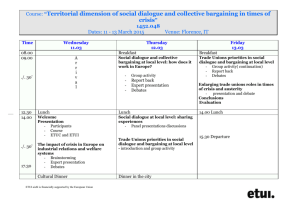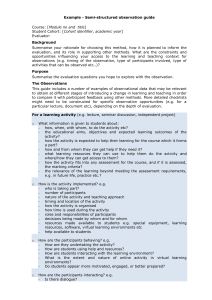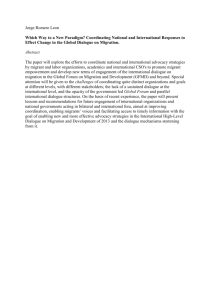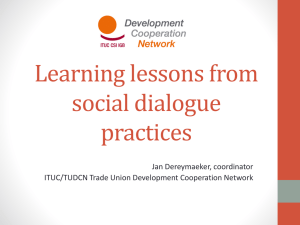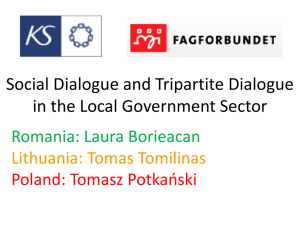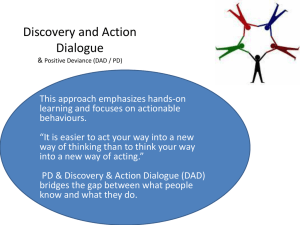PESSIS 2: Promoting employers` social services organisations in
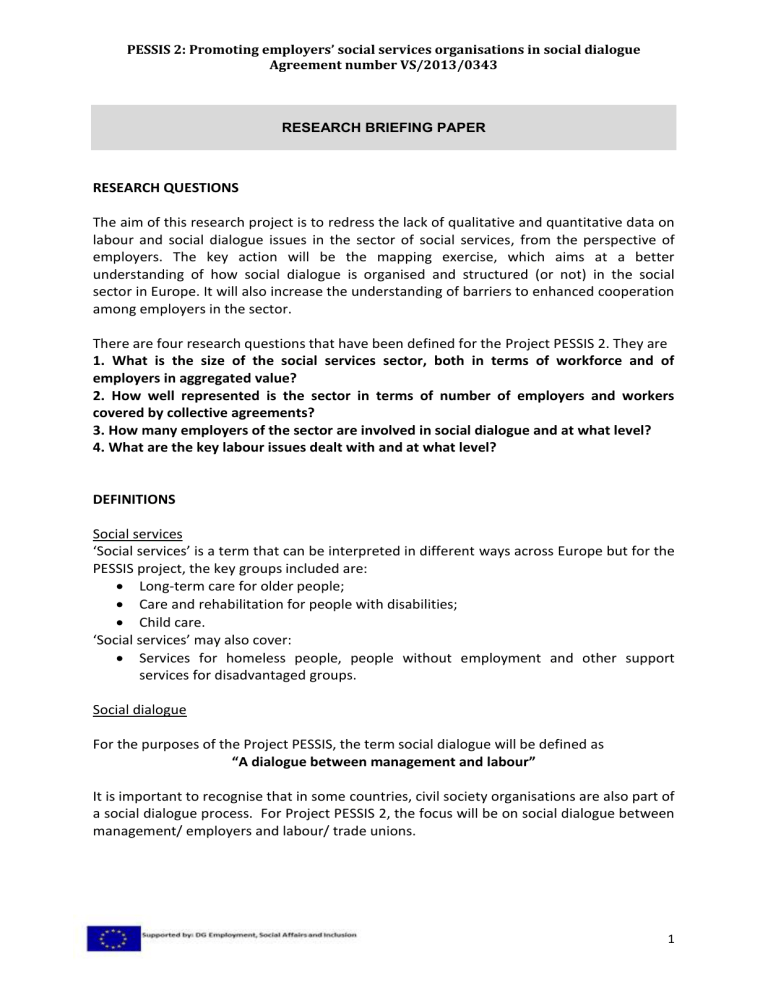
PESSIS 2: Promoting employers’ social services organisations in social dialogue
Agreement number VS/2013/0343
RESEARCH BRIEFING PAPER
RESEARCH QUESTIONS
The aim of this research project is to redress the lack of qualitative and quantitative data on labour and social dialogue issues in the sector of social services, from the perspective of employers. The key action will be the mapping exercise, which aims at a better understanding of how social dialogue is organised and structured (or not) in the social sector in Europe. It will also increase the understanding of barriers to enhanced cooperation among employers in the sector.
There are four research questions that have been defined for the Project PESSIS 2. They are
1. What is the size of the social services sector, both in terms of workforce and of employers in aggregated value?
2. How well represented is the sector in terms of number of employers and workers covered by collective agreements?
3. How many employers of the sector are involved in social dialogue and at what level?
4. What are the key labour issues dealt with and at what level?
DEFINITIONS
Social services
‘Social services’ is a term that can be interpreted in different ways across Europe but for the
PESSIS project, the key groups included are:
Long-term care for older people;
Care and rehabilitation for people with disabilities;
Child care.
‘Social services’ may also cover:
Services for homeless people, people without employment and other support services for disadvantaged groups.
Social dialogue
For the purposes of the Project PESSIS, the term social dialogue will be defined as
“A dialogue between management and labour”
It is important to recognise that in some countries, civil society organisations are also part of a social dialogue process. For Project PESSIS 2, the focus will be on social dialogue between management/ employers and labour/ trade unions.
1
PESSIS 2: Promoting employers’ social services organisations in social dialogue
Agreement number VS/2013/0343
DATA COLLECTION
This research project is exploratory research, which will gather data on a sector that is under-researched in terms of social dialogue. It will involve gathering several types of data at national, regional and local levels. There will be four types of data gathering, which will have to be managed simultaneously.
Stage 1 Existing research
To start the research process, it will be important to gather as much relevant research that had been done on the social services sector, in each country. This will vary from country to country. Four main sources will be employer organisations, trade unions and government departments and academic research. Reports may cover social dialogue, collective bargaining arrangements, other negotiating systems or wider perspectives on employment relations in the social services sector.
Stage 2 Mapping of social services
The mapping of social services by country at national, regional and local level will be the second part of the research. Depending on the materials gathered in Stage 1, there may already be data on the size of the social services sector, including number of employers, workers, volunteers.
Sources for this mapping data will be:
Government departments;
Workforce surveys;
Social services organisations working at national level;
Not for profit organisations;
Trade unions;
Academic research – for social services/ social care policies.
Stage 3
As this is an under-researched topic, the main form of data collection will take place through a series of interviews with key stakeholders or through a workshop with invited stakeholders. These interviews will aim to gather information on how employers are involved in social dialogue, collective bargaining agreements and how labour issues are dealt with at local, regional and national levels.
Suggested stakeholders are:
Employer organisations
Government departments
Trade Unions
Not for profit organisations
Private sector
If a workshop is arranged, the main issues will be assessment of current social dialogue, collective bargaining arrangements, how labour issues are dealt with and employer/ employee links with Europe. There will be some differences from country to country in terms of the structure of social services sector and the contribution by different sectors.
This will mean that the source of key informants will vary from country to country but
2
PESSIS 2: Promoting employers’ social services organisations in social dialogue
Agreement number VS/2013/0343 national level partners will be able to contribute to the process of identifying key stakeholders.
All interviews should be recorded and if possible, transcribed.
A basic question guide will be drawn up for use in the interviews and is set out below.
1.
What is your understanding of the social service sector?
2.
Which collective bargaining agreements cover parts or the whole of the social services sector?
3.
What do you understand by the term ‘social dialogue’?
4.
Are you involved in any social dialogue arrangements?
5.
What do you think are the main labour issues facing the social services sector?
6.
At what level(s) are these labour issues occurring?
7.
How do you think that they are currently being addressed - by level?
8.
How would you like to see them addressed in future?
Stage 4
Collective agreements and social dialogue agreements will be collected and subject to document analysis to identify the content of each agreement and which groups are covered.
These will probably become available after the stakeholder interviews. These will be important because they will provide information on how social dialogue is understood and the type of issues that are covered in any agreements.
ANALYSIS AND WRITING-UP
The timescale for the project PESSIS 2 is short. It will be important to start analysis of each stage as quickly as possible. The questions set out below, will try and support researchers in starting to write up the research findings. Please use this as a basic template for the analysis.
1.
Key research reports
What are the key issues emerging from published research?
Which groups are most active in social services sector?
Is there any form of social dialogue taking place in the social services sector?
Where are the gaps in research?
2.
Mapping of the social services sector
How many social services workers by gender, ethnic group, age by type of social service?
How many social services organisations in the public, private, not-for-profit (nfp) sectors?
What is the size (number of employees) of these organisations?
What is the value of services as seen through turnover/ revenues, profits (where relevant)
What are the main sources of funding for social services providers, e.g. government, charitable, income from user fees?
3.
Stakeholder interviews
3
Social dialogue
Labour issues
Analysis
Write up of national reports
Write up of
Final
European
Report
Agreement, design and production of final report
PESSIS 2: Promoting employers’ social services organisations in social dialogue
Agreement number VS/2013/0343
How is the social services sector defined?
What is the extent of collective bargaining agreements? Do existing arrangements cover part or the whole of the sector?
What are the different definitions of ‘social dialogue’?
To what extent are employers currently involved in social dialogue?
Have there been any attempts to set up social dialogue arrangements in the past?
What are the major labour issues facing the social services sector and at national, regional and local level?
4.
Social dialogue/ collective bargaining agreements
What are the main terms used in the agreements?
Which organisations are named in the agreements?
What type of issues are covered?
Time schedule
January – September 2014
Activities Jan Feb March April May June July August Sept
Review of existing research
Collection numerical data/ sectoral mapping
Collective agreements
4
PESSIS 2: Promoting employers’ social services organisations in social dialogue
Agreement number VS/2013/0343
Research strategy table
Research questions
Type of data
Size of sector - data on numbers of workers, employers, aggregated value
Extent of collective agreements
Numbers of employers involved in social dialogue and what level
Numerical data on workers broken down by gender, ethnic group, age
Numerical data on organisations
(public, private, not-for-profit
(nfp)
Value of services
– turnover/ revenues, profits
(where relevant)
Sources of funding
Collective agreements explaining public, private and nfp coverage.
Interviews.
Social dialogue agreements.
Employer association reports.
Interviews.
Key labour issues dealt with and at what level
Key informant interviews with employers, trade unions and government
Sources
Government departments
(health/ social services/ employment, community)
National statistical agencies
Trade unions
Professional associations
Analysis
What are the trends emerging at national, regional and local level?
Are there different trends for different types of social services, e.g. care for older people and child care?
Research method(s)
Use of secondary sources of data.
Basic descriptive statistics will be used to illustrate trends by country, level and type of service
Government departments
Trade unions
National voluntary/ nor for profit organisation
Existing employer organisations
Government, employer and trade union social dialogue agreements found in 6 countries for social services (or parts of social services)
National trade unions
Employer organisations
Government departments
What is the coverage of different sectors and types of services
At what level?
Mapping out social dialogue arrangements at national/ regional and local level by country
Identification of major issues through discourse analysis of key informant interviews
Document analysis
Interviewing key informants
Stakeholder analysis
Interviewing key informants
Unstructured interviews.
Analysis of interviews using key words
5
